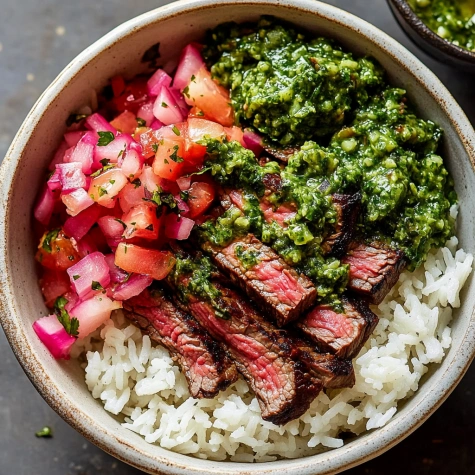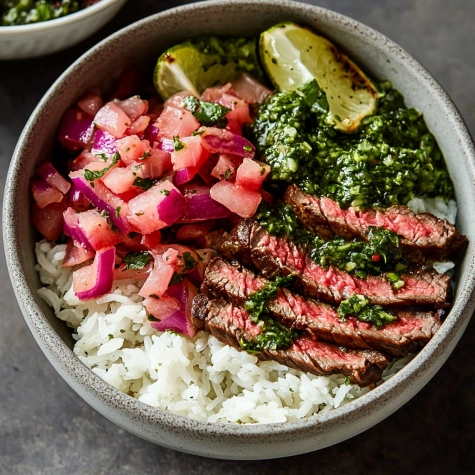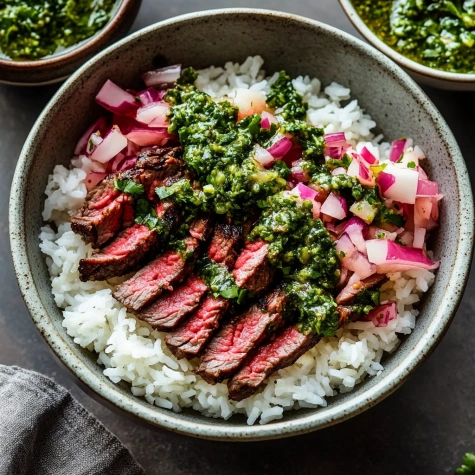 Pin it
Pin it
This vibrant steak rice bowl celebrates the marriage of perfectly seared meat with punchy, herbaceous chimichurri sauce. The combination creates a restaurant-worthy meal that comes together in under 30 minutes with minimal ingredients.
I first made this dish after returning from Argentina where chimichurri is practically a national treasure. The bright herbal sauce against the charred savory steak converted even my herb-averse teenager into a chimichurri enthusiast.
Ingredients
- Skirt steak: This thin cut cooks quickly and absorbs marinade beautifully. Look for meat with even thickness and marbling for best results.
- Kosher salt: The larger crystals adhere better to meat. Use Diamond Crystal brand if possible as it seasons more gently.
- Black pepper: Freshly cracked provides substantially more flavor than pre-ground alternatives.
- Neutral oil: Choose one with a high smoke point. Avocado oil is my preference for its clean flavor and heat stability.
- Chimichurri sauce: The star of the show, bringing brightness, acidity, and herb notes. Make extra to use throughout the week.
- White rice: The perfect canvas for soaking up the flavorful sauce and juices from the steak.
- Optional toppings: These add texture contrast and additional flavor dimensions to elevate the bowl.
Step-by-Step Instructions
- Prepare the steak:
- Pat the skirt steak completely dry with paper towels to ensure proper searing. Season generously and evenly with kosher salt and freshly cracked pepper. Allow the meat to rest at room temperature for exactly 15 minutes—this helps the steak cook more evenly from edge to center.
- Make the chimichurri:
- While the steak comes to temperature, prepare your cilantro chimichurri according to the recipe. The sauce will taste even better if made slightly ahead, allowing flavors to meld while you cook the steak.
- Heat your skillet:
- Place a cast iron skillet over high heat and preheat for a full 5 minutes. A properly preheated skillet is critical for developing that beautiful crust on the steak. The pan should be smoking hot—literally—before adding oil.
- Sear the steak:
- Add oil to the screaming hot pan—it should shimmer immediately. Carefully lay the steak away from you to prevent oil splatter. Let it sear undisturbed for 2 to 3 minutes until deeply browned. Flip and repeat for the second side, aiming for 125 to 130°F internal temperature for medium rare.
- Rest and slice:
- Transfer the steak to a cutting board and let it rest for 5 to 10 minutes. This allows juices to redistribute throughout the meat instead of spilling out when cut. Slice thinly against the grain for maximum tenderness.
- Assemble the bowls:
- Spoon warm rice into individual bowls, creating a bed for the other components. Arrange sliced steak over rice, then generously drizzle with chimichurri. Finish with flaky sea salt and any desired toppings.
 Pin it
Pin it
The chimichurri sauce is truly the heart of this dish. I learned its significance while traveling through Argentina, where families pass down their personal chimichurri recipes like treasured heirlooms. My friend Carlos’ grandmother showed me that letting the sauce sit for at least an hour before serving makes all the difference in developing those complex flavors.
Mastering Skirt Steak
Skirt steak requires specific handling to achieve its full potential. This thin cut comes from the diaphragm muscle and features prominent grain running through it. For maximum tenderness, always slice perpendicular to these muscle fibers. The difference is remarkable—tender meat versus chewy disappointment.
When cooking skirt steak, extremely high heat is essential. Its thin profile means it cooks quickly, so achieving that perfect sear without overcooking requires vigilance. I recommend using an instant-read thermometer when first learning to cook this cut properly. Once you develop the touch, you will know exactly when to pull it from the heat.
Chimichurri Variations
While the classic Argentinian chimichurri uses parsley, this recipe calls for cilantro, which brings a brighter, more aromatic profile. Feel free to experiment with herb combinations—cilantro and mint or even basil can create wonderful alternatives.
The acid component, traditionally red wine vinegar, can be substituted with lime juice for a different flavor profile. Some regions add a touch of honey to balance the acidity. My personal twist includes a small amount of orange zest, which adds subtle complexity and enhances the herbal notes.
 Pin it
Pin it
Making It Your Own
This bowl concept is infinitely adaptable to your preferences and what you have on hand. Substitute brown rice, quinoa, or cauliflower rice for different nutritional profiles. If skirt steak is unavailable, flank steak, flatiron, or even chicken thighs work beautifully with chimichurri.
For a complete meal, add sliced avocado, roasted vegetables, or a fried egg on top. My family enjoys adding pickled red onions for tang and crunch alongside sliced radishes for pepperiness. During summer months, grilled corn kernels add wonderful sweetness and texture contrast.
Frequently Asked Questions
- → What cut of steak works best for this dish?
Skirt steak is ideal for this dish because it has excellent flavor and becomes tender when sliced properly against the grain. If skirt steak isn't available, flank steak or hanger steak make good substitutes with similar cooking times and flavor profiles.
- → How do I know when my steak is medium-rare?
For medium-rare steak, aim for an internal temperature of 125-130°F (52-54°C). If you don't have a meat thermometer, you can use the touch test - medium-rare steak should feel like the base of your thumb when you touch your thumb and middle finger together.
- → Why is it important to slice the steak against the grain?
Slicing against the grain shortens the muscle fibers, making each bite more tender and easier to chew. This is especially important for cuts like skirt steak which have prominent muscle fibers. Look for the lines running through the meat and cut perpendicular to them.
- → Can I make the chimichurri sauce ahead of time?
Yes! Chimichurri sauce actually benefits from being made a few hours or even a day ahead, as this allows the flavors to meld. Store it in an airtight container in the refrigerator for up to 3 days. Just bring it to room temperature before serving.
- → What can I substitute for the white rice?
This versatile dish works well with many bases. Try brown rice for a nuttier flavor and more fiber, quinoa for added protein, cauliflower rice for a low-carb option, or even crispy roasted potatoes for something different.
- → How spicy is chimichurri sauce?
Traditional chimichurri has a mild to medium heat level from red pepper flakes. You can easily adjust the spiciness by reducing or increasing the amount of red pepper flakes in your sauce, or omitting them entirely for a non-spicy version.
